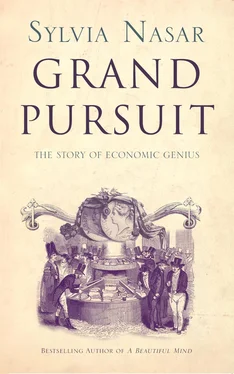Dickens’s sense that English society was waking up, as if from a long nightmare, proved prescient. Within a year of the Chartist “uprising,” a new mood of tolerance and optimism was palpable. The Tory prime minister admitted privately that many of the Chartists’ grievances were justified. 28Labor leaders rejected calls for class warfare and backed employers’ campaign to repeal import duties on grain and other foodstuffs. Liberal politicians responded to parliamentary commissions on child labor, industrial accidents, and other evils by introducing the Factory Acts of 1844, legislation regulating the hours of women and children.
Dickens never imagined that the world could get along without the calculating science of economics. Instead, he hoped to convert political economists as the Ghost of Christmas Future had converted Scrooge. He wanted them to stop treating poverty as a natural phenomenon, assuming that ideas and intentions were of no importance, or taking for granted that the interests of different classes were diametrically opposed. Dickens was especially eager for political economists to practice “mutual explanation, forbearance and consideration; something . . . not exactly stateable in figures.” 29When he launched his popular weekly, Household Words, he did so with a plea to economists to humanize their discipline. As he wrote in his inaugural essay, “Political economy is a mere skeleton unless it has a little human covering, and filling out, a little human bloom upon it, and a little human warmth in it.” 30
Dickens was not alone. There were—and would be—men and women in London and all over the world who reached the same conclusion. Having overcome formidable obstacles, they too saw man as a creature of circumstance. They too realized that the material conditions of life for the “nine parts in ten of the whole race of mankind” were no longer immutable, predetermined by the “blind and brutal past,” and utterly beyond human control or influence. Convinced that economic circumstances were open to human intervention yet skeptical of utopian schemes and “artificial societies” imposed by radical elites, they devoted themselves to fashioning an “engine of analysis” 31(or, as a later economist put it, an “apparatus of the mind”) 32that they could use to understand how the modern world worked and how humanity’s material condition—on which its moral, emotional, intellectual, and creative condition depended—could be improved.
Chapter I Perfectly New: Engels and Marx in the Age of Miracles Chapter I: Perfectly New: Engels and Marx in the Age of Miracles Chapter II: Must There Be a Proletariat? Marshall’s Patron Saint Chapter III: Miss Potter’s Profession: Webb and the Housekeeping State Chapter IV: Cross of Gold: Fisher and the Money Illusion Chapter V: Creative Destruction: Schumpeter and Economic Evolution Act II: Fear Prologue: War of the Worlds Chapter VI: The Last Days of Mankind: Schumpeter in Vienna Chapter VII: Europe Is Dying: Keynes at Versailles Chapter VIII: The Joyless Street: Schumpeter and Hayek in Vienna Chapter IX: Immaterial Devices of the Mind: Keynes and Fisher in the 1920s Chapter X: Magneto Trouble: Keynes and Fisher in the Great Depression Chapter XI: Experiments: Webb and Robinson in the 1930s Chapter XII: The Economists’ War: Keynes and Friedman at the Treasury Act III: Confidence Prologue: Nothing to Fear Chapter XIII: Exile: Schumpeter and Hayek in World War II Chapter XIV: Past and Future: Keynes at Bretton Woods Chapter XV: The Road from Serfdom: Hayek and the German Miracle Chapter XVI: Instruments of Mastery: Samuelson Goes to Washington Chapter XVII: Grand Illusion: Robinson in Moscow and Beijing Chapter XVIII: Tryst with Destiny: Sen in Calcutta and Cambridge Epilogue: Imagining the Future Notes Index Picture Section Acknowledgments About the Author Also by Sylvia Nasar Credits Copyright About the Publisher
The exact point is that it has not gone on a long time. [It is] perfectly new. . . .
Our system though curious and peculiar may be worked safely . . . if we wish to work it, we must study it.
—Walter Bagehot, Lombard Street 1
“See to it that the material you’ve collected is soon launched into the world,” the twenty-three-year-old Friedrich Engels wrote to his corevolutionist, Karl Marx. “It’s high time. Down to work, then, and quickly into print!” 2
In October 1844, continental Europe was a smoldering volcano threatening to erupt. Marx, the son-in-law of a Prussian nobleman and editor of a radical philosophy journal, was in Paris, where he was supposed to be writing an economic treatise to prove with mathematical certainty that revolution must come. Engels, the scion of prosperous Rhenish textile merchants, was at his family’s estate, up to his eyebrows in English newspapers and books. He was drafting a “fine bill of indictment” against the class to which he and Marx belonged. 3His only anxiety was that the revolution would arrive before the galleys.
A romantic rebel with literary aspirations, Engels was already an “embryonic revolutionary” and “enthusiastic communist” when he met Marx for the first time two years earlier. Having spent his adolescence freeing himself from his family’s strict Calvinism, the slender, fair, severely nearsighted Royal Prussian artillerist had trained his sights on the twin tyrannies of God and Mammon. Convinced that private property was the root of all evil and that a social revolution was the only way to establish a just society, Engels had yearned to live the “true” life of a philosopher. To his infinite regret, he was predestined for the family trade. “I am not a Doctor,” he had corrected the wealthy publisher of a radical newspaper who mistook him for a scholar, adding that he could “never become one. I am only a businessman.” 4
Engels Senior, a fervid Evangelical who clashed frequently with his freethinking son, wouldn’t have it any other way. As a proprietor, he was quite progressive. He supported free trade, adopted the latest British spinning equipment in his factory in the Wuppertal, and had recently opened a second plant in Manchester, the Silicon Valley of the industrial revolution. But as a father he could not stomach the notion of his eldest son and heir as a professional agitator and freelance journalist. When the global cotton trade collapsed in the spring of 1842, followed by the Chartist strikes, he insisted that the young Engels report to work at Ermen & Engels in Manchester as soon his compulsory military service was over.
Bowing to filial duty hardly meant the death of Engels’s dream of becoming the scourge of authority in all forms. Manchester was notorious for the militancy of its factory hands. Convinced that the industrial strife was a prelude to wider insurrection, Engels had been only too delighted to go where the action was and to use the opportunity to advance his writing career.
En route to England in November, he had stopped in Cologne, where he visited the grubby offices of the prodemocracy newspaper Rheinische Zeitung, to which he had been contributing occasional articles under the byline X. The new editor was a brusque, cigar-smoking, exceedingly myopic philosopher from Trier who treated him rudely. Engels had taken no offense and had been rewarded with an assignment to report on the prospects for revolution in England.
When Engels arrived in Manchester, the general strike had petered out and the troops had returned to their London barracks, but there were unemployed men hanging around street corners, and many of the mills were still idle. Despite his conviction that the factory owners would rather see their employees starve than pay a living wage, Engels could not help noticing that the English factory worker ate a great deal better than his counterpart in Germany. While a worker at his family’s textile mill in Barmen dined almost exclusively on bread and potatoes, “Here he eats beef every day and gets a more nourishing joint for his money than the richest man in Germany. He drinks tea twice a day and still has enough money left over to be able to drink a glass of porter at midday and brandy and water in the evening.” 5
Читать дальше












